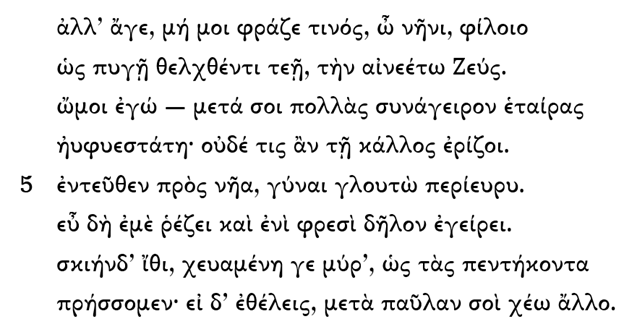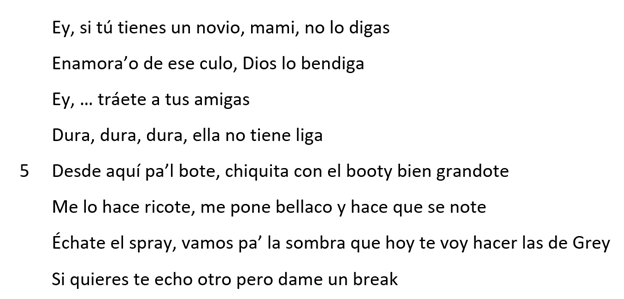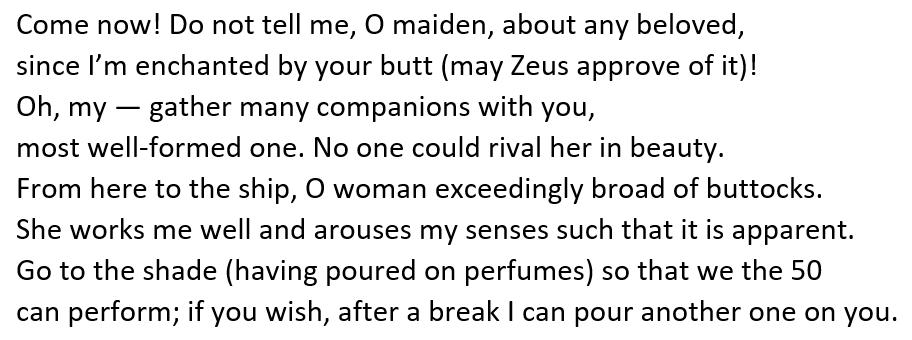i needed a distraction so i translated Bad Bunny& #39;s section from the song "Está Rico" (w/ Marc Anthony and Will Smith) into Ancient Greek hexameter.
there& #39;s a lot of nuance. it& #39;s also rather crude. i wanted to see how a dead language would hold up.
let& #39;s dive in.
there& #39;s a lot of nuance. it& #39;s also rather crude. i wanted to see how a dead language would hold up.
let& #39;s dive in.
in line 1 i had to simply the meaning a bit to fit everything in the verse. so instead of "if you have a bf, don& #39;t tell," my version reads "don& #39;t tell me about any bf" (φράζω + GEN & #39;tell of& #39;)
i translate & #39;mami& #39; with νῆνι, the vocative of a dial. form of νεᾶνις & #39;young woman& #39;
i translate & #39;mami& #39; with νῆνι, the vocative of a dial. form of νεᾶνις & #39;young woman& #39;
in l. 2, θελχθέντι is a masc dat participle =& #39;enchanted& #39; that agrees with μοι in l. 1.
i changed & #39;[enchanted] with this (ese) butt& #39; to & #39;with YOUR (τεῇ) butt.& #39;
"culo" is a pretty coarse word; i don& #39;t know that πυγή can render that aspect of it, but at it means & #39;butt& #39;
i changed & #39;[enchanted] with this (ese) butt& #39; to & #39;with YOUR (τεῇ) butt.& #39;
"culo" is a pretty coarse word; i don& #39;t know that πυγή can render that aspect of it, but at it means & #39;butt& #39;
1 of my favorite bits is this parenthetical "Dios lo bendiga" (may God bless it) where lo = ese culo.
i think it works well as one of those Homeric not-quite-relative clauses with a demonstrative (like τὸν ... τέκε Λητώ in Il. 1.36): τὴν αἰνεέτω Ζεύς & #39;may Zeus approve of it!& #39;
i think it works well as one of those Homeric not-quite-relative clauses with a demonstrative (like τὸν ... τέκε Λητώ in Il. 1.36): τὴν αἰνεέτω Ζεύς & #39;may Zeus approve of it!& #39;
in l. 3 we have the interjection & #39;ey& #39; taking up the entire 1st hemistich. i thought it made sense to go with ὤμοι ἐγώ & #39;oh, my& #39;.
where the Spanish has & #39;bring your friends,& #39; the Gk says & #39;gather many companions with you.& #39;
where the Spanish has & #39;bring your friends,& #39; the Gk says & #39;gather many companions with you.& #39;
dura = & #39;hot& #39; (lit. & #39;firm& #39;).
l. 4 was challenging bc i did not want to translate & #39;dura (x3)& #39; with a 3x-repeated word in Gk; so i took εὐφυής & #39;shapely, well-formed& #39; and stretched it out a bit into its fem. superlative form, with εὐ- also becoming ἠϋ- for metrical reasons.
l. 4 was challenging bc i did not want to translate & #39;dura (x3)& #39; with a 3x-repeated word in Gk; so i took εὐφυής & #39;shapely, well-formed& #39; and stretched it out a bit into its fem. superlative form, with εὐ- also becoming ἠϋ- for metrical reasons.
"ella no tiene liga" lit. means "she doesn& #39;t have a league"; in other words, everyone is out of her league, or she has no comparison. in Greek i have "no one could rival (ἐρίζω) her in beauty," with τὸ κάλλος & #39;beauty& #39; in the accusative of respect/limitation.
the first 1/2 of l. 5 seems a bit unconnected in the Spanish (="from here to the boat") but i preserved that in Gk (with νῆα & #39;ship& #39; for & #39;boat& #39;).
the 2nd half of l. 5 i translate as a vocative phrase.
chiquita -> γυνή is a little bland, i know. however, i do like περίευρυς & #39;exceedingly broad,& #39; with γλουτώ being a *dual* (=buttocks) accusative of limitation (like πόδας ὠκὺς Ἀχιλλεύς "Achilles swift w/r/t foot")
chiquita -> γυνή is a little bland, i know. however, i do like περίευρυς & #39;exceedingly broad,& #39; with γλουτώ being a *dual* (=buttocks) accusative of limitation (like πόδας ὠκὺς Ἀχιλλεύς "Achilles swift w/r/t foot")
for l. 6, ἐμέ & #39;me& #39; serves double duty as the object of both verbs in the Greek.
me lo hace ricote = she does it to me very well
ῥέζω & #39;to work, perform& #39; is a great verb that makes it sound almost ritualistic; and it is cognate with both ἔργον and English & #39;work.& #39;
me lo hace ricote = she does it to me very well
ῥέζω & #39;to work, perform& #39; is a great verb that makes it sound almost ritualistic; and it is cognate with both ἔργον and English & #39;work.& #39;
the 2nd half of l. 6: "she makes me horny and makes it show" (i.e. makes it so that it& #39;s visibly apparent; use your imagination).
for poner bellaco, i have ἐν φρεσὶν ἐγείρει & #39;arouses [my] senses.& #39;
i& #39;m told bellaco is a fairly vulgar word. sorry about that.
for poner bellaco, i have ἐν φρεσὶν ἐγείρει & #39;arouses [my] senses.& #39;
i& #39;m told bellaco is a fairly vulgar word. sorry about that.
the last part of this line (y hace que se note) was impossible to do proper justice to while keeping everything within a single line. i& #39;ve rendered it simply as the adj δῆλον & #39;apparent, obvious& #39; which agrees with ἐμέ. "she arouses my senses, such that i am obvious about it."
in l. 7 it gets fun. it& #39;s too much to squeeze into one Gk line, but everything is crucial (so that a pun later in l. 8 makes sense), so one verb does spill over into l. 8.
the Sp has "put on your spray (perfume); let& #39;s go to the shade b/c today i& #39;m going to do those [shades] of Grey to you."
as in "50 Shades of Grey." i didn& #39;t want to use any proper nouns in the Gk, so i changed "las de Grey" into τὰς πεντήκοντα, "the 50 [shades]"
as in "50 Shades of Grey." i didn& #39;t want to use any proper nouns in the Gk, so i changed "las de Grey" into τὰς πεντήκοντα, "the 50 [shades]"
this, of course, means that the line ends in a spondee, not a dactyl. but hey, if Homer did it 1/20 of the time, i think 1/8 should be allowed for me, a noob.
note also that the ONLY way i could compact & #39;into the shade& #39; was by borrowing the allative suffix: σκιήνδε & #39;shadowwards& #39;
note also that the ONLY way i could compact & #39;into the shade& #39; was by borrowing the allative suffix: σκιήνδε & #39;shadowwards& #39;
the orig l. 8 has "if you want, i& #39;ll throw/put (echar) another (sc. *spray*) to you, but [first] give me a break."
so, again, use your imagination.
so, again, use your imagination.
to make this pun work i needed to make sure that l. 8 contains the active counterpart (χέω, 1sg subj) of the aorist middle participle (χευαμένη) from l. 7.
for ἄλλο, sc. μύρον & #39;perfume& #39; based on μύρα in l. 7.
μετὰ παῦλαν = & #39;after a break/cessation& #39;
for ἄλλο, sc. μύρον & #39;perfume& #39; based on μύρα in l. 7.
μετὰ παῦλαν = & #39;after a break/cessation& #39;
the Greek may not be perfect (i was looking fruitlessly for a good translation of & #39;horny& #39; for a long time, finding only κεράτινος & #39;made of horn& #39;) but it was a fun composition exercise.
here& #39;s an English version of the end result
here& #39;s an English version of the end result
and though i consider myself a Spanish speaker at this point, i could NOT have paid such attention to detail without @Pattzruiz to guide me through certain confusing structures, esp. the ins and outs of Puerto Rican slang.
 https://abs.twimg.com/emoji/v2/... draggable="false" alt="❤️" title="Red heart" aria-label="Emoji: Red heart">
https://abs.twimg.com/emoji/v2/... draggable="false" alt="❤️" title="Red heart" aria-label="Emoji: Red heart">
oh yeah, and check out the song:
https://www.youtube.com/watch?v=--BHuKeveg4
our">https://www.youtube.com/watch... section in question begins at 1:45.
https://www.youtube.com/watch?v=--BHuKeveg4
our">https://www.youtube.com/watch... section in question begins at 1:45.

 Read on Twitter
Read on Twitter


![in l. 2, θελχθέντι is a masc dat participle =& #39;enchanted& #39; that agrees with μοι in l. 1.i changed & #39;[enchanted] with this (ese) butt& #39; to & #39;with YOUR (τεῇ) butt.& #39;"culo" is a pretty coarse word; i don& #39;t know that πυγή can render that aspect of it, but at it means & #39;butt& #39; in l. 2, θελχθέντι is a masc dat participle =& #39;enchanted& #39; that agrees with μοι in l. 1.i changed & #39;[enchanted] with this (ese) butt& #39; to & #39;with YOUR (τεῇ) butt.& #39;"culo" is a pretty coarse word; i don& #39;t know that πυγή can render that aspect of it, but at it means & #39;butt& #39;](https://pbs.twimg.com/media/EVU6nByWoAEjF3G.png)





![the orig l. 8 has "if you want, i& #39;ll throw/put (echar) another (sc. *spray*) to you, but [first] give me a break."so, again, use your imagination. the orig l. 8 has "if you want, i& #39;ll throw/put (echar) another (sc. *spray*) to you, but [first] give me a break."so, again, use your imagination.](https://pbs.twimg.com/media/EVVPI2kWAAIFesQ.png)



